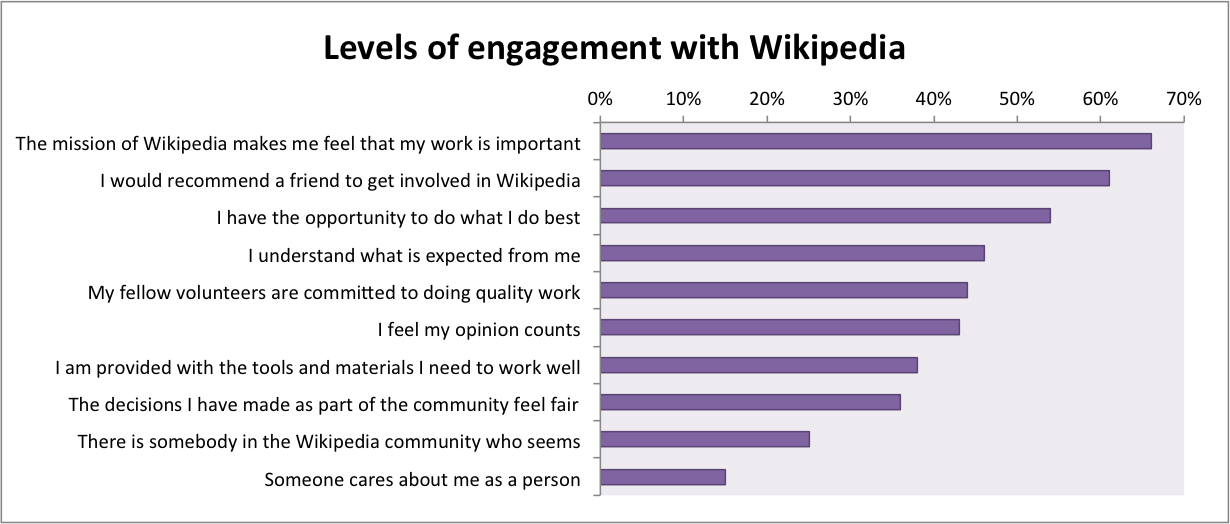As many as 57 percent of Wikipedians who responded to the December 2011 Editor Survey scored a perfect ten on the Wikipedia Editor Satisfaction Index. This is a marked improvement over the 47 percent from April 2011, and is based on a significantly larger sample of 5,911 respondents. The average score improved less markedly (7.76 vs. 7.65 in April), which suggests we have more editors at both extremes.
In an effort to understand the general satisfaction of the Wikipedia community as well as how their interactions and experiences shape it, we had defined the Wikipedia Editor Satisfaction Index (WESI) during the April 2011 Editor Survey. We used responses to two questions on the survey: how they described their fellow editors (picking from a set of adjectives), and whether they believed community feedback had helped them personally. These responses were weighted, and then normalized to a 0-10 rating. We repeated this analysis for the December 2011 survey.
a. More established Wikipedians score higher, though there is a “chasm”
b. Arabic, Italian Wikipedia editors most satisfied; German, Japanese and Portuguese are least satisfied
c. Editors appreciate constructive improvements from others, and the occasional compliment
d. A majority of Wikipedians say the mission of Wikipedia makes them feel their work is important
a. More established Wikipedians score higher, though there is a “chasm”
A comparison of WESI by various levels of editing activity reveals two strong themes. Firstly, there is an almost linear relationship between edit count and WESI scores. This means that editors with higher edit counts are likely to be more satisfied with their editing experience on the site. The immediate implication is that as we move closer to the core of the editing community, we are amongst the most satisfied of our editors. It is reassuring to note that the heart of the community is pleased with their experiences on Wikipedia.
The second observation is the slight drop in satisfaction ratings when we move from small (1-9) to more significant (10-99) edit counts. While the actual drop is not that huge, it relates to a fairly large section of our group, so the difference cannot be ignored. We theorize that there is a “chasm” that editors must cross to move from casual to more regular editors. In this period of time, a new editor begins to come to terms with various editing policies, guidelines, as well as the fellow community. This does seem to make a case for providing a nurturing and mentoring environment for new editors as they figure out editing practices, rules, and guidelines.

b. Arabic, Italian Wikipedia editors most satisfied; German, Japanese and Portuguese are least satisfied
To get a better sense of how editor satisfaction varies across Wikipedias, we compared WESI scores for some of the languages with high response rates. While editors from the Arabic (8.4) and Italian (8.4) Wikipedias scored significantly higher than the average, German (7.3), Japanese (7.3) and Portuguese (7.4) scored significantly lower.

c. Editors appreciate constructive improvements from others, and the occasional compliment
To understand how specific experiences shape editor satisfaction, we ran a linear regression on editors’ responses to the questions about the interactions and experiences they have had on Wikipedia (Q18a, Q18b). We found that editors who a. had other editors add new content or fix mistakes on their contributions or b. received compliments from other editors on their work were much more likely to report a higher level of satisfaction with their Wikipedia experience.
On the other hand, editors who felt they were being looked down upon by more experienced editors, or had experiences other editors pushing their POV, were significantly more likely to report lower satisfaction levels. Getting edits reverted was another important factor that negatively affected satisfaction.
Experiences like the addition of offensive/inaccurate material to articles the respondents were working on, or getting an article selected as “featured article” didn’t have a significant impact on satisfaction. In an interesting departure from the April 2011 results, receiving barnstars did not have a noticeable impact on satisfaction.
d. Majority of Wikipedians say the mission of Wikipedia makes them feel their work is important
In a new question introduced for December, we asked respondents to share more about their engagement levels with Wikipedia. It is interesting to note that German Wikipedians chose certain alternatives significantly more often than the average: “Someone cares about me as person” (28 percent vs 15 percent average) and “My fellow volunteers are committed to doing quality work” (59 percent vs 44 percent average).

This analysis provides us some key insights that can be used to reach out to editors in different geographies, at different levels of “tenure” to make editing fun and satisfying for those who score lower on the index, and learn from those who score higher so their experiences can be replicated. We are hoping that these findings can help move us towards a Wikipedia that everyone loves to edit.
Ayush Khanna, Data Analyst, Global Development
Mani Pande, Head of Global Development Research
In December 2011, we conducted an online survey of Wikipedia editors in 17 languages. This is the fourth in a series of blog posts summarizing our findings. If you are interested, you can find out more about the methodology of the survey here.

Can you help us translate this article?
In order for this article to reach as many people as possible we would like your help. Can you translate this article to get the message out?
Start translation